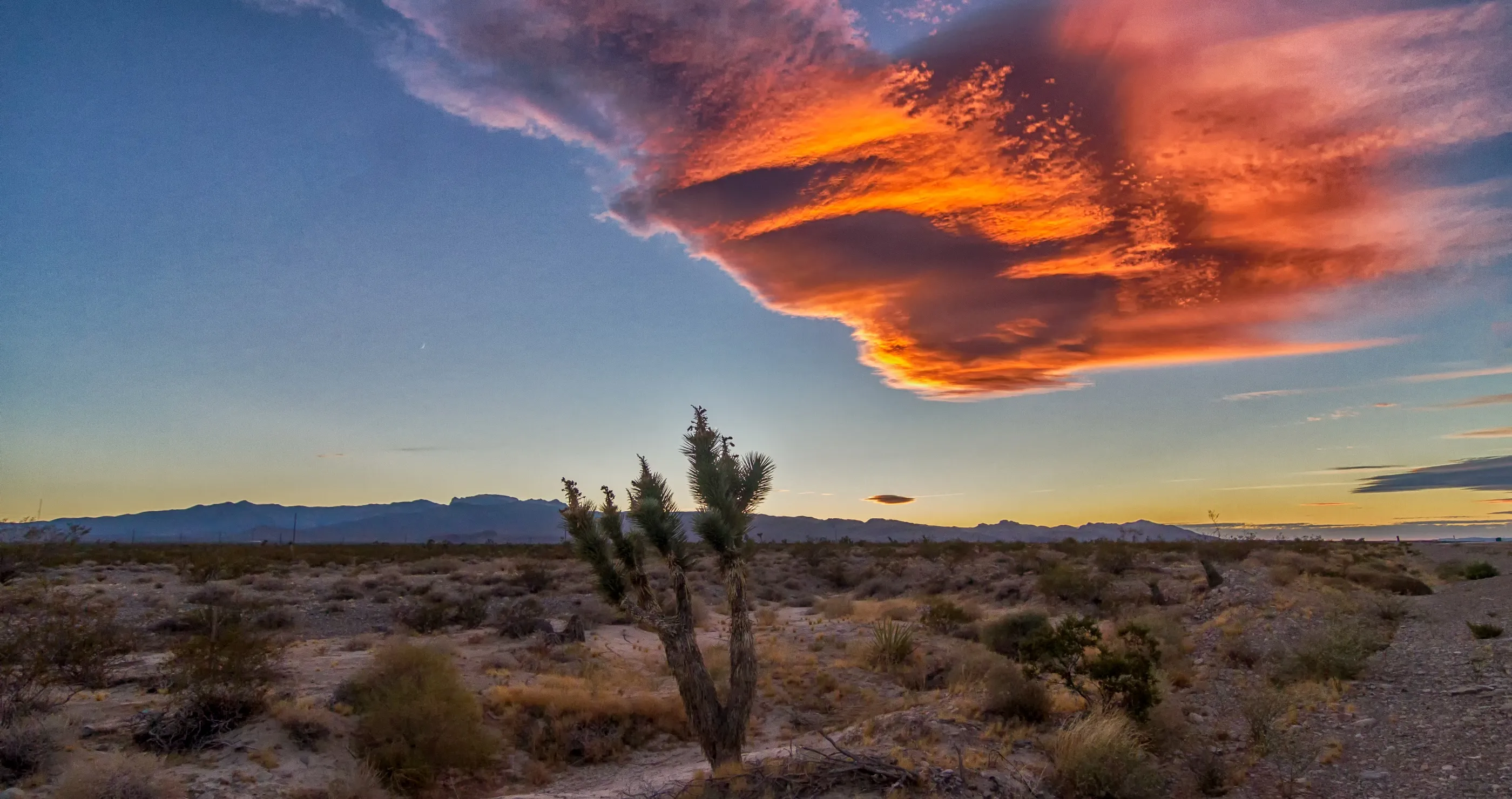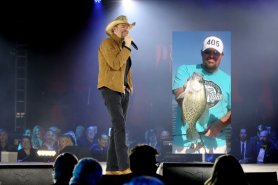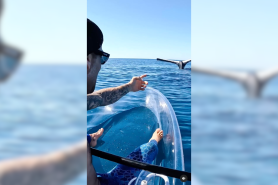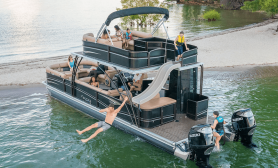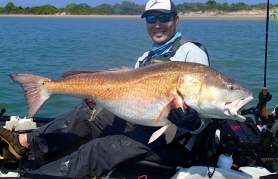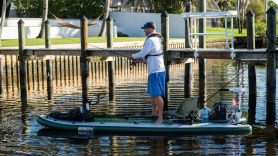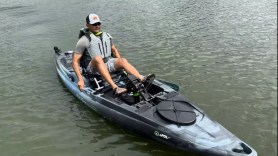

Sunbathing and surfing draw most tourists to Florida’s Space Coast, but anglers don’t want to miss the opportunity to land huge predators at night.
Videos by Outdoors
It was sunset on Florida’s Space Coast. By that time the beaches, which are normally packed with tourists throughout the day, were largely empty. The tourist set had spent most of the day surfing, swimming, and tanning under the hot June sun but by evening they crowded into the bars, shops, and restaurants situated along the shoreline. A band played classic rock covers on a patio overlooking the water to a crowd of sun-reddened tourists with beers and margaritas in hand. Across the bay an enormous cruise ship had just docked and passengers were exiting after a week-long tour of the Caribbean.
Related Stories: 440-Pound Great White Shark Jumps In Boat, Lands On Fisherman
Everyone was settling in for the night. But not me. My family and I were headed down to the marina where one captain was cleaning a boat and loading supplies. His name is Garren Malin and he is a captain with Sea Leveler Charters. We shook hands and I stepped on board.
“You ready to catch some sharks?” Garren asked. We were indeed.

Florida welcomed roughly 113 million tourists last year, most of whom travel here for the beaches. And since tourism is the number one industry there it’s understandable that the state doesn’t go out of its way to announce to the nation at large that it is home to more shark bites than anywhere else in the world. Part of that has to do with the sheer number of people in the water here; a shark could hardly swim along the state’s Atlantic Coast without inadvertently bumping into a wading vacationer, and thankfully most of the bites are cases of mistaken identity rather than full-out predatory assaults. But one thing is clear—Florida is home to a bunch of hungry sharks.
Greg Rapp hasn’t shied away from the abundant sharks here, though. He operates Sea Leveler Charters in Cape Canaveral and while Greg’s company leads a wide variety of private fishing trips targeting everything from flounder and sea trout to sailfish and cobia he and his crew have become specialists in the sport of night shark fishing.
Related Stories: LETHAL reef lion fish caught off Florida coast!
Garren Malin is one of Greg’s employees, a young captain who has spent much of his life in these waters. As we loaded the boat at dusk with the steel drums and guitars echoing from the marina’s bar he gaveus a rundown of what we could expect over the next four hours. We’d head south along the Space Coast to fish a deserted stretch of sand that lying in the shadow of the Mercury program launch pad. The sharks, Garren said, would come cruising into the shallows (eight to ten feet) from deeper water in search of food. Garren doesn’t think that the movement of the sharks is strictly predicated by the time of day. The receding tide meant there would be more prey in the water.
“I like to use bonita for bait,” Garren says as he ran a heavy-duty hook through a fresh, red portion of carved-up fish. “They’re oily fish and they do a good job attracting sharks.” He casted a line into the water and it hit with the force of a basketball crashing into the surf. I checked the depth finder. We were in eight feet of water.
There are few more enjoyable ways to spend an evening on the Space Coast than relaxing on a boat in a sheltered stretch of coastline with the bay breeze keeping the bugs at bay while you watch the sun sink into the horizon. Suddenly line began hissing off the reel.

“Reel fast!” Garren said. There’s little finesse to hooking a shark, you simply crank in line as quickly as possible and wait for the circle hook to do its job. My sister-in-law Heather hauled the rod free of the holder and tucked it under her arm, lifting the tip and reeling down against the weight of the fish.
One of the most exciting elements of night shark fishing—aside from the fact that you’re tying on to one of nature’s oldest and most formidable predators—is that you never know quite what you’ll have on the other end of the line. The most commonly caught shark species on the Space Coast are spinners, Atlantic blacktip and blacknose, requiem sharks in the three to four-foot range. Sometimes, however, you catch something much, much larger. Hammerheads, bull, lemon and nurse sharks are all found here, and some of them attain very impressive lengths and weights.


“That’s a big fish,” Garren said as if to warn Heather that she was in for a serious battle. He was right. Heather would gain line on the shark, lifting until we were certain that the fish would break the surface, and then the shark would make a hard run and peel line off into the darkening water. Each time she lifted the tip of the rod it was as though she were pulling against a submerged stump. After some time she handed the rod off to her father John.
The comparison to hooking a stump seemed accurate when John finally pulled the shark to the surface, for the huge barrel body that we saw rise from the water on the side of the boat was the same color as fresh dirt.
“It’s a nurse shark,” Garren said, “the biggest one I’ve seen.” We hauled the shark—which turned out to be an exceptionally large female, onto the back of the boat for photos and then turned her loose.
As darkness feel we took turns hauling in sharks one by one. When one of the reels would begin losing line the next person would step in and begin fighting. Jason Smith caught a very nice Blacknose shark, and my wife Bethany caught a spinner and a blacktip. My only shark of the night was a huge nurse that wasn’t quite as large as the first one that Heather and John landed but seemed anchored to the bottom as I tried to haul it up from the black water. Garren guessed that the one I caught weighed in the neighborhood of 200 pounds and measured six feet long. The first nurse shark had been thirty percent larger.
Sharks are one of the most overlooked game fish in the sea, viewed more as a menace than a target species. But guys like Greg Rapp and Garren Malin are changing that, and more and more anglers are taking advantage of these abundant, hard-fighting fish. What they’re learning is there’s nothing quite like hearing line hiss off a reel in the moonlight and knowing there’s a hungry predator on the other end.
For more info about night shark fishing visit www.sealeveler.com

